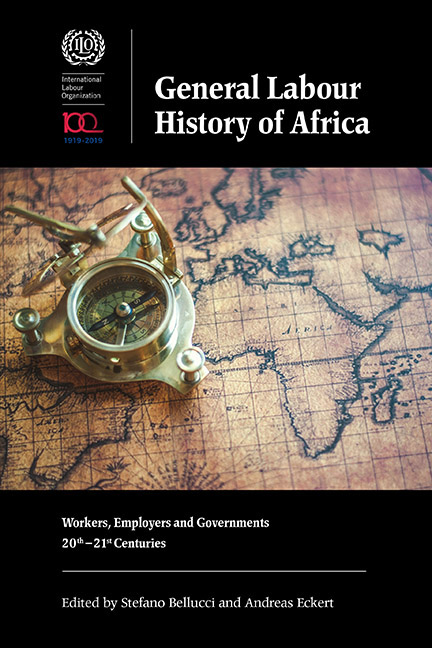Book contents
- Frontmatter
- Contents
- List of Maps and Figures
- List of Tables
- Notes on Contributors
- Foreword
- Acknowledgements
- The ‘Labour Question’ in Africanist Historiography
- Part I Free and Unfree Labour
- Part II Key Sectors
- Part III International Dimensions and Mobility
- Part IV Varieties of Work
- 10 Domestic Work
- 11 Military and Police
- 12 Crime and Illegal Work
- 13 White-Collar Workers
- 14 Sport, Tourism and Entertainment
- Part V Entrepreneurs and Self-Employment
- Part VI The State, Unions and Welfare
- Part VII Conclusions
- Select Bibliography
- Index
14 - Sport, Tourism and Entertainment
from Part IV - Varieties of Work
Published online by Cambridge University Press: 21 September 2019
- Frontmatter
- Contents
- List of Maps and Figures
- List of Tables
- Notes on Contributors
- Foreword
- Acknowledgements
- The ‘Labour Question’ in Africanist Historiography
- Part I Free and Unfree Labour
- Part II Key Sectors
- Part III International Dimensions and Mobility
- Part IV Varieties of Work
- 10 Domestic Work
- 11 Military and Police
- 12 Crime and Illegal Work
- 13 White-Collar Workers
- 14 Sport, Tourism and Entertainment
- Part V Entrepreneurs and Self-Employment
- Part VI The State, Unions and Welfare
- Part VII Conclusions
- Select Bibliography
- Index
Summary
A general twentieth-century history of labour in entertainment in Africa requires simultaneously a level of detail and a level of abstraction that is difficult to reconcile, especially so in an area of labour so broad. The problem is aggravated by the paucity of literature on African labour history in this area, where references are often scattered and sources are fragmentary. This chapter has been structured around shifting labour relations within three broad fields of entertainment that demonstrate both commonalities and differences: tourism, performing and recording arts, and sport. The discussion will centre on various forms of labour relations and converge on a number of focuses. The selection of the particular kinds of labour relations and the specific places on which to focus the different discussions has been informed by three concerns: the availability of literature, the representation of geographical areas and the magnitude of labour within them. Of course, no such selection can ever be comprehensive, and there will necessarily be gaps. Yet what follows makes it possible to conceive of the contours of the changing conditions of labour within entertainment in twentieth-century Africa.
The taxonomic division of what frequently appears in very fluid and hybrid forms of labour relations poses a real challenge. The taxonomy that has been adopted here is meant to illustrate the shifts between unpaid and paid labour and between self-employment and wage labour. As van der Linden has noted, ‘the borderline between “free” wage labour, self-employment and unfree labour is in reality not clear-cut’, and ‘the intermediate forms between the different categories are fluid rather than sharply defined’. For this reason, the categories employed below should not be considered as definitive and uniform, but rather as porous, compound and fluid. As will be made clear, the character of labour relations within these categories was every bit as fluid as that between them.
A final note pertains to the absence of a discussion of relatively ‘free’ and decidedly unfree labour. The reason for this is pragmatic. The references to unfree entertainment labour in the twentieth century are scarce in the literature. This certainly does not mean to suggest that decidedly unfree and forced labour did not exist within the field.
- Type
- Chapter
- Information
- General Labour History of AfricaWorkers, Employers and Governments, 20th-21st Centuries, pp. 405 - 422Publisher: Boydell & BrewerPrint publication year: 2019



